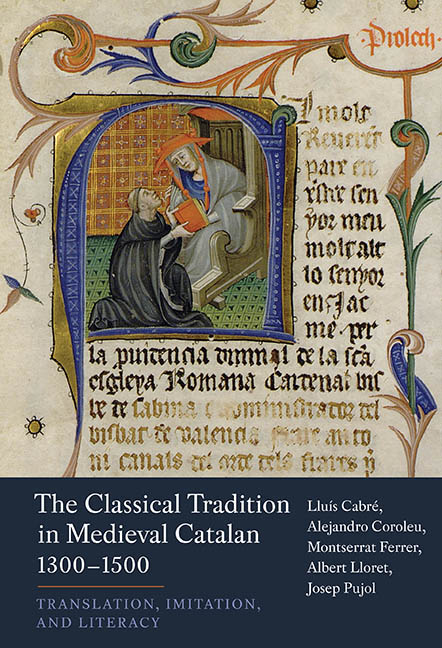Book contents
- Frontmatter
- Contents
- List of Maps
- Preface
- List of Abbreviations
- Part I The Classical Tradition in Medieval Catalan
- Part II Catalogue of Translations to 1500
- List of Authors and Works
- Descriptive Catalogue
- Appendix 1 Italian Renaissance: Printed Editions, 1473–1535
- Appendix 2 Rulers of the Crown of Aragon, 1137–1516
- Bibliography
- Index of Manuscripts
- Index
Descriptive Catalogue
from Part II - Catalogue of Translations to 1500
Published online by Cambridge University Press: 03 July 2019
- Frontmatter
- Contents
- List of Maps
- Preface
- List of Abbreviations
- Part I The Classical Tradition in Medieval Catalan
- Part II Catalogue of Translations to 1500
- List of Authors and Works
- Descriptive Catalogue
- Appendix 1 Italian Renaissance: Printed Editions, 1473–1535
- Appendix 2 Rulers of the Crown of Aragon, 1137–1516
- Bibliography
- Index of Manuscripts
- Index
Summary
Classical Antiquity
Alexander (the legend of)
➀ Collatio Alexandri Magni cum Dindimo rege Bragmanorum de philosophia per litteras facta (5th or 6th century AD)
• Greek? > Latin > Catalan
• The origins of this correspondence lie in the debate between Alexander and the Brahmins, transmitted in Greek and Latin in a variety of witnesses, among which is the so-called Commonitorium Palladii, a text attributed to Palladius of Galatia, Bishop of Helenopolis (4th–5th century ad). The Collatio takes its inspiration from a passage in the Commonitorium in which King Dindimus pledges to write to Alexander (Ross 1963: 30–2). The epistolary exchange consists of five letters: three, including the opening and closing ones, from Alexander, the other two from Dindimus. Apart from this version, which can be found independently or at times appended to Julius Valerius's Epitome, there are two further versions: one of these (Collatio III; →➁ below, Leo of Naples) is interpolated in the Historia de preliis and is the source for T2. For the reception of the legend of Alexander in all European literatures (except Catalan) see Gaullier-Bougassas (2014).
T1 Lletres d'Alexandre el Gran al rei Dídimo (Jaume Domènec op, 1384)
The Catalan translation stems from the abridged Latin version included in Vincent of Beauvais's Speculum historiale, which adds a further letter at the beginning of the text to the five gathered in the Collatio (Ivars 1928: 157). In Vincent's text this letter is from the Brahmins to Alexander, but in the Catalan translation it is from King Dindimus, as is clear from the manuscript rubric (Ivars 1928: 161). Ivars dated this text to the mid-15th century (1928: 159), unaware that it was an excerpt from Jaume Domènec's late 14th-century Compendi historial (→VINCENT OF BEAUVAIS).
MS. Madrid, BNE, MS 7811, fols 465v–469, s. XV4/4 – s. XVI1/2 / s. XVIin (Villar 1995: 155) (Manid 1565)
MOD. ED. Ivars (1928)
BIBL. Riquer (1934b: 93); Rubió i Balaguer (1949–58: III, 832)
T2 Lletres d'Alexandre a Dídamo rei dels brangians
Related to the Collatio III, it is interspersed in the Historia de preliis (→➁ below, Leo of Naples).
- Type
- Chapter
- Information
- The Classical Tradition in Medieval Catalan, 1300–1500Translation, Imitation, And Literacy, pp. 161 - 224Publisher: Boydell & BrewerPrint publication year: 2018



